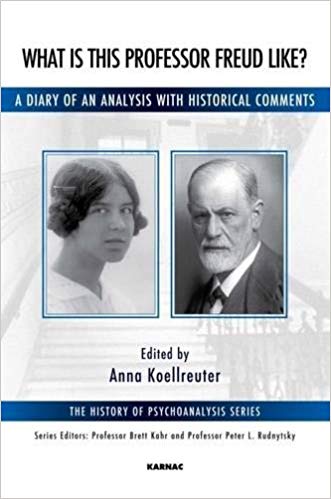
Ed. Anna Koellreuter. Trans. Kristina Pia Hofer. Karnac Books, 2016. 117pp.
Rita Teusch, PhD, Faculty Member of BPSI. Her remarks below originally appeared in the Spring 2018 issue of the Hann Sachs Library Newsletter, which can be read here.
This historically fascinating book presents the diary notes (33 pages) of a 27 year old female Swiss psychiatrist, Dr. Anna Guggenbühl, written during her four month long analysis with Freud, six times a week, in 1921 (a total of 83 sessions). Her two diaries were discovered several years after her death, and were given to Dr. Anna Koellreuter, a psychoanalyst, and Dr. Guggenbühl’s granddaughter. These diary notes were published in Germany in 2009, in France in 2010, and have also been staged as a theatrical reading by actors in Zürich. Now this book has become available in an English translation.
The book contains an Introduction by Dr. Koellreuter: the Story of the Diary, and six chapters: 1. the Diary, 2. Facsimiles of Freud’s letter to the patient, several pages of Dr. Guggenbühl’s diary as well as photos of Dr. Guggenbühl and her family. 3. Dr. Koellreuter’s reflections on her grandmother’s diary notes. 4. Professor Karl Fallend, a noted continental psychoanalytic historian describes the development of psychoanalysis in the light of the political upheavals in post-WWI Vienna; 5. Dr. Ernst Falzeder discusses Freud as Analyst and Therapist; 6. Psychoanalyst Andre Haynal provides “a supervision of Freud’s methods from today’s point of view”, (p. xx1).
What makes this book so special and different from other patient accounts of their analyses with Freud is the immediacy of these diary notes. Dr. Guggenbühl sought analysis because she had been engaged for 7 years, but was highly conflicted about marrying her fiancé. When Freud agreed to see her, she left her life in Zürich for four months to engage in the analysis. She wrote down her thoughts, memories and dreams during her work with Freud, including her frank discussions of sexuality and her transference love for Freud. She recorded her dialogue with Freud and how he reacted to her. While her account is far from systematic, the diaries provide insight into how Freud worked in 1921 before he fell ill with cancer, which made it painful for him to talk. Freud comes across as very engaged, making many interpretations, mostly of an Oedipal kind, and addressing the transference. Dr. Koellreuter writes that her grandmother had said “it was Freud’s presence, his being in the same room, above all, that had been effective; words were only of secondary importance” (p. 66). After the analysis ended, Dr. Guggenbühl returned to Zürich, broke off her engagement, worked as a psychiatrist in Paris and soon met her future husband, a sculptor, with whom she had four children and lived together for 60 years.
I highly recommend this book to everyone interested in hearing Freud’s voice in his consulting room. Reading Dr. Guggenbühl’s diary notes is enjoyable because they allow us into the intimate internal world of a professional woman at a time when it was still highly unusual for women to pursue a medical education and have a career. Finally, the reflections on the historical, social and analytic context of this analysis by notable Freud scholars are illuminating, greatly enrich this text and make it a very worthwhile read.
Rita Teusch, PhD,is a Training and Supervising Analyst and faculty member of the Boston Psychoanalytic Society and Institute. She is a part-time Lecturer in Psychiatry (Psychology) at Harvard Medical School, Cambridge Health Alliance and provides supervision to psychology interns and postdoctoral fellows at Cambridge Hospital. Dr. Teusch has a private practice in Harvard Square, Cambridge, MA
Rita Teusch can be contacted by email here.
***
The opinions or views expressed on the Boston Psychoanalytic Society & Institute (“BPSI”) social media platforms, including, but not limited to, blogs, Facebook posts and Twitter posts, represent the thoughts of individual contributors and are not necessarily those of the Boston Psychoanalytic Society & Institute or any of its directors, officers, employees, staff, board of directors, or members. All posts on BPSI social media platforms are for informational purposes only and should not be regarded as professional advice.
BPSI does not control or guarantee the accuracy, relevance, timeliness or completeness of information contained in its contributors’ posts and/or blog entries, or found by following any linked websites. BPSI will not be liable for any damages from the display or use of information posted on its website or social media platforms. BPSI cannot and does not authorize the use of copyrighted materials contained in linked websites.

